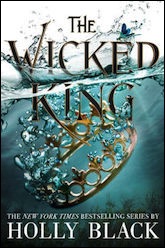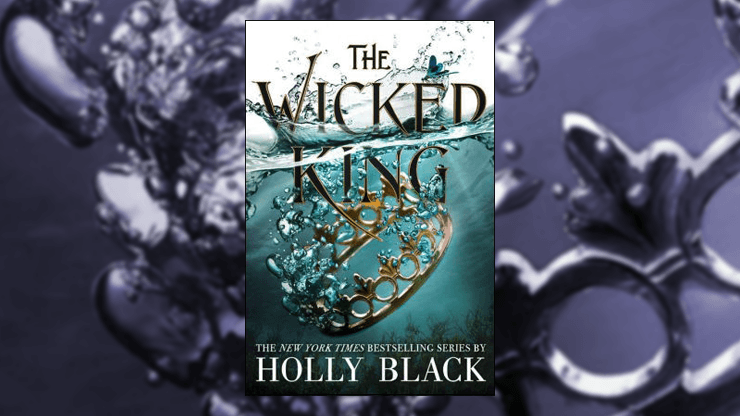The Wicked King is the second novel in Holly Black’s Folk of the Air series, set five months after the close of last year’s much-discussed The Cruel Prince (reviewed here). Jude has placed Cardan on the throne with herself as seneschal in an attempt to preserve her youngest sibling’s freedom from the crown for at least a year and a day. One masterful maneuver at the game of kings has gifted her immense, though secret, control—but now she has to maintain it when beset by danger on all sides, even from those she’s least willing to suspect.
And worse, the upheaval of political alliances and feuds she’s kicked into motion might signal the end of the Court as she knows it if she’s unable to consolidate her power while juggling her own familial and personal problems. Her siblings—soon to be married Taryn and erstwhile Vivi—seem to think it’s all a game, that she’s still the same sister she was, when even Jude isn’t sure who she’s become under the sway of great authority and risk. Jude is a spymaster, an unspoken regent, and a sometimes-murderer; running a kingdom is not her forte, but it’s a requirement for survival nonetheless. The real question is, how long can she keep the balancing act up?
(Mild spoilers.)
The Wicked King plows through the potential for middle book stagnancy with constant high-tension action. Jude and Cardan’s games of alliance, betrayal, and kingdom-building crash into one another endlessly, bringing to conclusion or further evolution several issues that arose at the close of the first novel. Black makes it obvious that, despite being brilliant and ruthless, Jude is still green as fresh wood compared to the actual adult rulers of the others courts—and so is Cardan. The lesson of the prologue, from Madoc, sets the tone for the entire book: it’s easy to grab power, but it’s not easy to hold it.
Jude is under siege from all sides. The advisory court won’t listen to her, her adoptive father is both proud and furious with her for her betrayal of him (and she hasn’t told him why), Cardan is an unpredictable charge at best and an adversarial one at worst, plus the court of the sea is pushing for a war with the court on land. She’s playing the game of kings against faeries who’ve lived and ruled for centuries; it’s not an ideal situation, and she exacerbates it on a regular basis with impulsivity, secrecy, and ill-timed suspicion or lack thereof. This bundle of conflicts, all maddeningly inter-related and cloaked in layers of deception, keeps the book galloping along without pause.
But the relentless pace of the plot also has downsides: the lush, dynamic character development that drove The Cruel Prince is not foregrounded here. The book sprints from clash to clash, scheme to confrontation to scheme, kidnapping to torture to betrayal, and as a result, Jude has less time to reflect while the narrative lacks the room to engage with other characters’ motivations. Notably, the most significant, driving relationship in The Wicked King is between Madoc and Jude—though one would expect it might be Cardan and Jude. The ongoing struggle between Madoc and his ward-daughter highlights the clash of paternal and filial loyalties, competition and courtesy, and the difficult transition from child to equal adult. Black’s novels often deal with grey morality and feature mature, depth-oriented approaches to human nature (something I love), so it’s fascinating to see that multifaceted approach applied to the father/daughter, captor/mentor dynamic between Madoc and Jude.
Conversely, it is an occasional frustration that much of the plot for The Wicked King rests on Jude either failing to communicate dreadfully important information or dismissing warnings/hints that the reader notices without issue. While this device is effective and nail-biting when used sparingly, it begins to feel monotonous if it is the main source of conflict. The narrative point of the continual failure to communicate effectively is understandable: she’s barely grown and, no matter how smart she is, she’s not playing with the same amount of cards the nigh-on-immortal adversaries she’s up against have in their possession. She’s hotheaded and impulsive despite her strategic mind, so the internal conflict makes perfect sense and illustrates the flaws she has as a ruler. As a reader, though, her failure to learn from past mistakes of this sort was starting to irk me, particularly regarding Taryn—though I suppose we have at least one more novel for that to pan out.
Buy the Book


The Wicked King
Quibbles aside, the strong thematic concerns I adored continue on from the first novel at full strength. Black is careful but frank in her approach to both sexuality and violence in this series—death has weight, sex has weight, emotions are predictably unpredictable and often ugly. The characters, despite being faeries for the most part, are indelibly human in the best and worst ways. Jude’s captivity and torture have ongoing physical and psychological consequences once she’s released. Her raw grit and internal strength get her through alive, but she is not in one piece, nor would she be.
And it’s worth noting that I’m not talking about a grimdark cavalcade of brutality, here. Pretty much the opposite: horrible things happen and have horrible, real consequences. Violence is not done without cost to the individuals involved—it isn’t violence for the sake of violence and it’s never for the shock factor. It feels bad, as it should, to read. Jude isn’t untouched by the things she must do and the trials she endures. Trauma outlasts its initial infliction in The Wicked King, and I’m interested to see how that plays out in the next novel—as much as I’m interested to see what Cardan’s intentions are with his parting command to Jude as monarch. Power dynamics drive these books, and given this novel’s conclusion as well as its unresolved conflicts, I’ll be on the edge of my seat waiting to see how the pull-and-push between Jude and Cardan turns out.
The Wicked King does not suffer middle-book doldrums, and though its pacing is hectic and the punches keep coming without pause, it maintains a serious investment in the human realities of the trauma it dishes out. Jude and Cardan both are survivors with hard edges, often unable to communicate from their respective positions of suspicion, control, and desire, but perhaps the next novel will see the start of a healthier resolution to their internal conflicts—while also tackling the ongoing political upheaval they’ve created.
The Wicked King is available from Little, Brown Books for Young Readers.
Lee Mandelo is a writer, critic, and editor whose primary fields of interest are speculative fiction and queer literature, especially when the two coincide. They have two books out, Beyond Binary: Genderqueer and Sexually Fluid Speculative Fiction and We Wuz Pushed: On Joanna Russ and Radical Truth-telling, and in the past have edited for publications like Strange Horizons Magazine. Other work has been featured in magazines such as Stone Telling, Clarkesworld, Apex, and Ideomancer.










